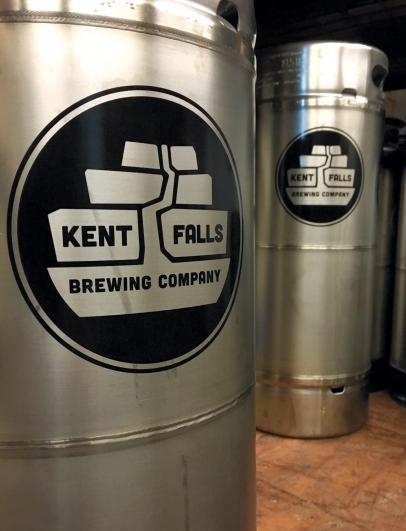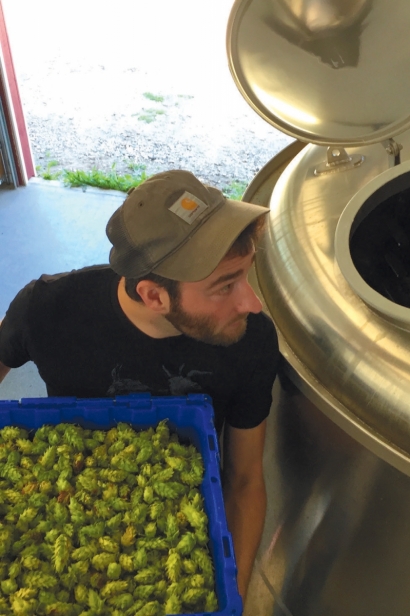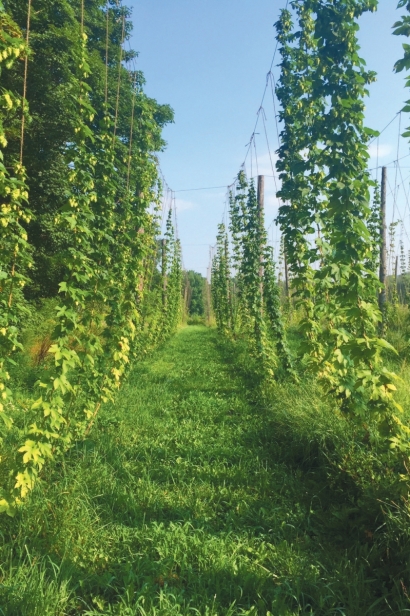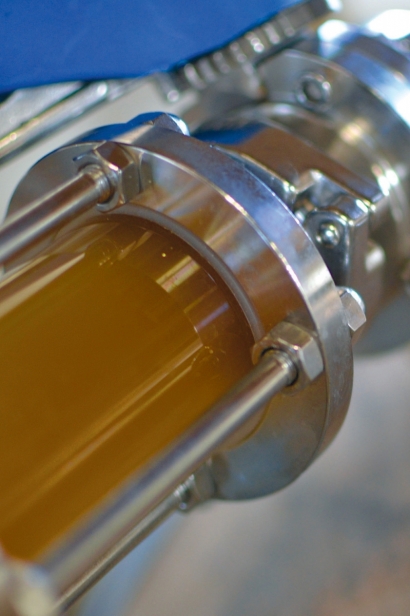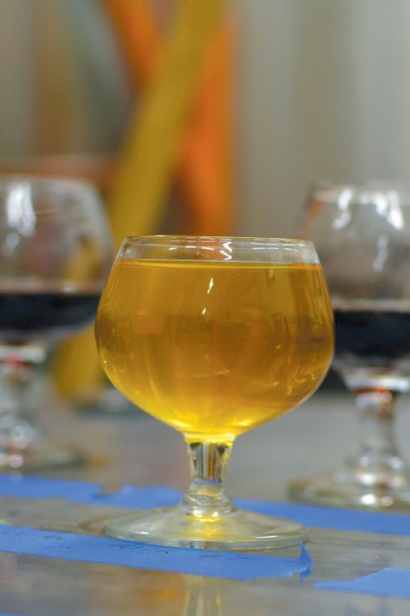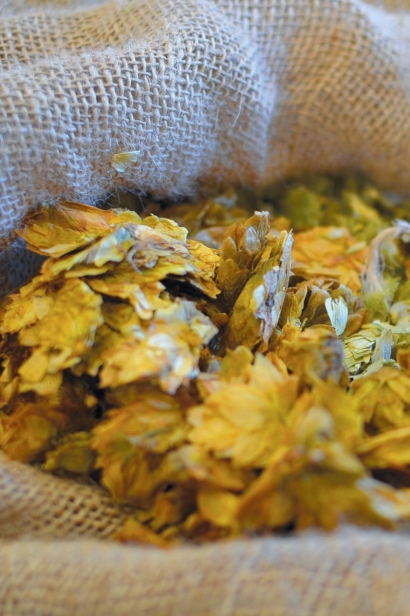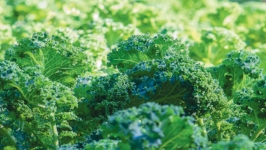Kent Falls Brewing Company
A Year of Growth
A notable newcomer to Connecticut's craft beer scene, Kent Falls Brewing Company has quickly (and rightfully) earned a reputation for producing an exciting array of terroir-driven ales. We chatted with co-founder Barry Labendz about the brewery's first year of business, its dedication to using locally sourced ingredients, and its future on-site tasting room.
Edible Nutmeg: Your brewery is based on Camps Road Farm in Kent. Can you tell us about the property?
Barry Labendz: It's about 50 acres. It had been, for 30 years, a dairy farm under the previous owners called Fools Day Farm. Camps Road was born when we moved onto the property in the summer of 2012. We started to remediate the land to raise the poultry and pork we sell through our CSA and at the New Milford Farmers' Market. We also planted a 1.5-acre hop yard with several varieties and nearly 400 cider trees in a similarly sized orchard for our off-site distillery, Neversink Spirits in Port Chester, NY. It took a while, but we were finally able to build the brewery and start operations in February of last year.
EN: The Food Cycle is the name used to represent the farm, the brewery, and the distillery as a whole.
BL: Right. The goal is to have each business succeed on its own merits while working together to "close loops" and be as efficient as possible. It's about creating a perpetual cycle of converting outputs from one side of the operation into inputs for another.
EN: What are some examples of the cycle in motion?
BL: Well, for instance, spent grain from the brewery and distillery come back to the farm for compost. But the most notable – and certainly the most visible – are the hop yard and the apple orchard. When you drive up our street, the hop yard is one of the first things that catches your eye. We hope to harvest up to 3,000 pounds of hops each year for the brewery, once the yard reaches full maturity, and the orchard will provide the apples for a special estate apple brandy for Neversink Spirits.
EN: On the brewery's website you say, "We considered some other locations for the brewery, in part because Connecticut currently lacks a farm brewery law." Did your situation change that?
BL: It hasn't, at least not yet. The state hasn't included brewing in its definition of agriculture, nor has it yet passed a farm brewery license, though we should note that the latter doesn't necessarily mean the brewery has to be on a farm. And I think things are moving in the right direction. Last year, a law passed that allows beer manufactured in the state to be sold at farmers' markets, and that's been very helpful for us, since we haven't opened a retail space yet. Also, there's been over 14 acres of hops planted last year in Litchfield County, alone! I've received a lot of emails from people looking to start their own hop yards or farm breweries. It's pretty incredible and inspiring, when you think about it; there's an amazing amount of commitment and passion that's required to do these things in the face of the obstacles created by a lack of legal infrastructure for small farms and breweries. But I think we will get there eventually.
EN: What kinds of beers do you make?
BL: A lot of farmhouse ales, including tart, clean, and dry-hopped saisons; table beers; goses; beers with Brett[anomyces] yeast; and mixed-fermentation beers. We also do a rotating series of northeastern IPAs. We've covered a broad spectrum stylistically, but the focus is consistent: always aromatic, flavorful, and refreshing beers that won't overpower the palate.
EN: When did you sell your first batch of beer?
BL: After a ridiculously long night of packaging, we drove up to At The Corner in Litchfield and sold them the first keg on March 10th of last year. They were amazing about it, tapped the keg right away, and gave us a terrific welcome to Connecticut's beer scene.
EN: How would you describe your first year of business?
BL: Extremely challenging, but definitely rewarding and educational. Over the course of 2015 we expanded our fermentation capacity by 66% without hiring any additional people. It took an insane amount of work, but I guess we've accomplished a lot: making 40 different beers, bottling by hand, self-distributing all of our beer across the state, and establishing a great network of accounts. It's all been an amazing learning experience, and we're excited about future growth.
EN: There's a movement by brewers across the country, including you, to use locally sourced ingredients. Why does it interest you?
BL: Beer is an agricultural product, and sourcing locally can make it both richer and higher-quality. I think people want to know where that product is coming from. I definitely feel that way in my personal life, and that translates into what we put into our beer.
Moreover, sourcing ingredients locally supports farms and other businesses, builds friendships, and it's a way to learn significantly more about the products you're using. At any point in the growing season, we can head to a nearby farm to see how something's growing or walk out into our hop yard and get a sense of the aromas and flavors that our hops will have, and we're able to make a beer around that.
And for our barrel-aged fruited beers, there's no replacing using whole fresh fruit that we can get here. In addition to the freshness, the naturally occurring wild yeast and bacteria that live on the fruit skins can help contribute a deep and complex character that's impossible to get from fruit purée or extract. Learning about the production methods and varietal differences between commercially available fruits and the smaller batch, hand-grown varieties we work with has been really educational. It's all a very intimate process.
EN: What are some of the local ingredients you've used?
BL: We've brewed with a pretty wide variety: grains, hops, and herbs such as orange and chocolate mint. The fruit we use in our barrelaged beers is all local. We've used cherries from Starberry Farm in Washington Depot, grapefruits grown by Peter Talbot in Washington, CT, blueberries from Rose's Berry Farm in South Glastonbury, and peaches from March Farm in Bethlehem.
We just made a gose with 90 pounds of honey harvested by both Beavertide Bee Farm in Falls Village and Hannan Honey in Southbury. In total, last year, we used about 10,000 pounds of two-row barley grown in Rocky Hill to make our "Field Beer" saison. And for "Tiny House," our wet-hopped, mixed-fermentation harvest ale, we add almost 100 pounds of hops picked fresh from our own yard and use six-row barley grown and malted in the Hudson Valley.
We even have a few barrels of spontaneously fermented beer that we're working on. This involves having the beer rest in a "coolship" outside the brewery overnight, and wild yeast, bacteria, and true Camps Road Farm microflora are the only agents of fermentation. It'll be a while until these barrels are emptied and released, but it's one of the projects we're most excited about.
EN: Can you tell us about your current barrel-aging program?
BL: Right now we're aging in about 20 barrels, most of which are a mix of neutral red and white wines. We also have three used bourbon barrels from Litchfield Distillery. We've only released a few beers from this program: "When Life Gives You Grapefruits," a farmhouse ale with grapefruit juice and zest; "Second Nature Peach," a sour saison brewed with 200 pounds of peaches; and "Second Nature Cherry," a sour saison aged with 90 pounds of Montmorency cherries. This year, we're dedicating more time to blending, bottling, and experimenting with the barrels. When we open to the public, we expect to have our first blended, barrel-aged farmhouse ale ready. It's called "Nature."
EN: Can you tell us about the tasting room? When do you expect to open?
BL: Hopefully by late April or early May, and we'll be open seasonally. We're only going to sell our bottled IPAs and other beers to guarantee that they'll be purchased in the freshest condition possible. Also, we're setting up some areas around the farm for a self-guided farm tour as well as preparing to have our farm store open.
This interview has been edited and condensed.
Kent Falls Brewing Company
860-398-9645
33 Camps Rd, Kent, CT 06757


